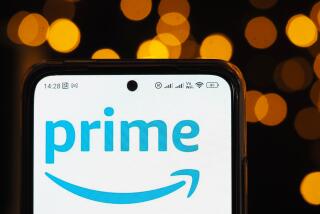The Next Mother Lode? : Giants Fight Over New Generation of Wireless Phones; Critics Scoff
- Share via
About 10 years after cellular phones became one of the most popular and lucrative new consumer technologies of the 20th Century, the nation’s communications giants are battling for permission to deliver the next generation of wireless telephones.
Promising an inexpensive, go-anywhere link for voice and computer chatter, these so-called personal communication services have attracted scores of well-heeled, would-be providers, including cable TV and cellular operators, newspaper publishers, hand-held computer makers, Baby Bell phone companies and long-distance carriers.
All are tantalized by the same lure: Personal communication services are supposed to become the next high-tech mother lode, possibly drawing as many as 60 million subscribers--many with tiny radio-equipped computers--over the next decade and generating billions in revenues and profits.
But not all will be allowed to join the latest wireless gold rush.
The Federal Communications Commission is expected to announce, possibly as early as Sept. 23, how many companies will be allowed to offer the new services and how large a territory they will be permitted to cover. Like cellular, the new services operate on radio waves. However, the waves are shorter and they cover a smaller territory.
Exactly which companies will win access to these new airwaves won’t be decided until next June, when the FCC is expected to hold its first-ever auction of the public airwaves to carry the wireless service, an event that is supposed to generate $7 billion to $10 billion for Uncle Sam.
While the primary focus remains on the FCC and its efforts to generate new competition for existing cellular operators, it is still unclear precisely what these new personal communication services will be and whether consumers will be able to afford them.
A critical issue is the upcoming auction, which may force participants to pay dearly for licenses only to discover that they will have to price their services beyond the consumer’s wallet.
Further, there is as yet no clear vision of what these new services will offer consumers beyond what is already available from cellular operators or cordless telephones that work in and around the home.
“Will it be Cellular Lite? Will it be cordless phones on steroids?” asks Herschel Shosteck, a Washington-area telecommunications analyst. “No one has really examined consumer demand. And given the vision of riches, to do so is to engage in something between heresy and treason.”
There have been studies of the potential services--more than 150 of them over the last three years.
However, the overwhelming conclusion could pose a dilemma for any would-be provider. According to Telocator, a market research association sponsored by the telecommunications industry, customers want everything that cellular currently offers--and more. And they want it to cost less than cellular.
Studies generally show consumers are willing to spend between $25 and $45 a month for new wireless phone service, roughly half what cellular subscribers are currently spending.
“We frankly don’t see that PCS (personal communications services) can do anything that cellular can’t,” says a spokesman for Southwestern Bell Mobile Systems, the cellular arm of the San Antonio-based regional telephone company.
“We think that cellular can do everything PCS can do, but that PCS can’t do all that cellular can.”
*
It’s a debate that won’t be easily settled. But generally speaking, cellular has more power and covers a larger territory than its new sibling, while PCS promises less-expensive service.
William Tieman, director of marketing and public policy at Telesis Technologies Laboratory in Walnut Creek, Calif., says he believes that the PCS customer is entirely different from the cellular subscriber and will want entirely different wireless telephone services.
The cellular customer, he argues, was an “A-type personality” who needed a mobile phone for work. The PCS customer, he says, will want the phone as a security device and will use it primarily to call family members and friends.
But there are other visions for PCS. Some see it as an ideal communication device for workers such as nurses, doctors, janitors, security guards and teachers who walk around a relatively small area all day. Such phones would be better than a pager because they would allow the worker to return calls immediately.
“The key here is to realize that this is not a technology game, like cellular was,” says Tieman. “It’s a marketing game.”
Cellular on the Rise
The number of cellular subscribers is growing...1984, 100,000 - 1993, 14,000,000*, while the average monthly bill of subscribers is falling.
Source: Cellular Telecommunications Industary Assn.: Herschel Shostek Associates Ltd.






